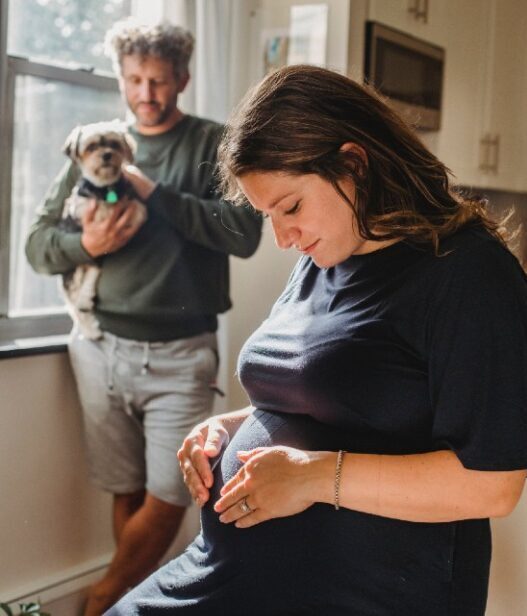COVID-19 & Pregnancy
The COVID-19 Vaccine
Effects on Pregnancy, Breastfeeding & Conception
We are staying on top of recent COVID-19 vaccine developments to arm you with the knowledge to make the best decisions for your health while you are pregnant or trying to get pregnant.
Refer to the Centers for Disease Control and Prevention (CDC) for the latest information for pregnant women, breastfeeding moms, and newborns.
Vaccine Basics for New & Expecting Moms
- Pregnant and breastfeeding women weren’t included in the initial COVID-19 vaccine trials. More data will be available as time goes on.
- Understand as much as you can about COVID and the vaccine by asking a trusted source, like your midwife or doctor.
- You have two options: 1) Get the COVID-19 vaccine when it is available to you or 2) Wait for more information about vaccinating pregnant women to become available.
- If you are not eligible for vaccination, we recommend waiting for the most up to date data before you make your decision.
- The Society for Maternal-Fetal Medicine strongly recommends that pregnant individuals have access to COVID vaccines and to discuss options with their healthcare professional.


Pregnancy
- “While safety data on the use of COVID-19 vaccines in pregnancy are not currently available, there is also no data to indicate that the vaccines should be contraindicated.” (Source: ACOG)
- Pregnant people are at increased risk for severe illness from COVID-19 (Source: CDC)
- “ACOG recommends that COVID-19 vaccines should not be withheld from pregnant individuals who meet criteria for vaccination based on ACIP-recommended priority groups” (Source: ACOG)
- According to the CDC, health experts believe mRNA vaccines are unlikely to pose a risk for people who are pregnant. This recommendation is based on how mRNA vaccines work:
- “… healthcare workers, who are considered prioritized for vaccination, be offered the vaccine if pregnant” (Source: SMFM)

Breastfeeding
- “COVID-19 vaccines should be offered to lactating individuals similar to non-lactating individuals when they meet criteria for receipt of the vaccine based on prioritization groups outlined by the ACIP.” (Source: ACOG)
- “There is no need to avoid initiation or discontinue breastfeeding in patients who receive a COVID-19 vaccine” (Source: ACOG)
- “During lactation, it is unlikely that the vaccine lipid would enter the bloodstream and reach breast tissue. If it does, it is even less likely that either the intact nanoparticle or mRNA transfer into milk. In the unlikely event that mRNA is present in milk, it would be expected to be digested by the child and would be unlikely to have any biological effects.
- While there is little plausible risk for the child, there is a biologically plausible benefit. Antibodies and T-cells stimulated by the vaccine may passively transfer into milk. Following vaccination against other viruses, IgA antibodies are detectable in milk within 5 to 7 days. Antibodies transferred into milk may therefore protect the infant from infection with SARS-CoV-2.
- “Although the biology is reassuring, for definitive information, we will have to wait for data on outcomes once the vaccine is used in lactating individuals and their children.” (Source: ABM)
Questions About Pregnancy & the COVID-19 Vaccine?
- Should pregnant women get the COVID-19 Vaccine?
- What are the dangers of getting COVID while pregnant?
- How does the COVID-19 vaccine work?
- Will the COVID-19 vaccine give me Coronavirus?
- What are the side effects of the vaccine?
For most people, getting the COVID vaccine as soon as possible is the safest choice. However, trials testing the vaccine in pregnant and breastfeeding women have not been completed.
COVID patients who are pregnant are 5 times more likely to end up in the intensive care unit (ICU) or on a ventilator than COVID patients who are not pregnant.
Preterm birth may be more common for pregnant women with severe COVID, but other obstetric complications such as stillbirth do not appear to be increased.
Pregnant women are more likely to die of COVID than non-pregnant women with COVID who are the same age.
The development and use of mRNA vaccines is relatively new. These vaccines consist of messenger RNA (mRNA) encapsulated by a lipid nanoparticle (LNP) for delivery into the host cells. These vaccines utilize the body’s own cells to generate the coronavirus spike protein (the relevant antigens), which, similar to all other vaccines, stimulates immune cells to create antibodies against COVID-19. The mRNA vaccines are not live virus vaccines, nor do they use an adjuvant to enhance vaccine efficacy.
These vaccines do not enter the nucleus and do not alter human DNA in vaccine recipients. As a result, mRNA vaccines cannot cause any genetic changes (CDC, Zhang 2019, Schlake 2012). Based on the mechanism of action of these vaccines and the demonstrated safety and efficacy in Phase II and Phase III clinical trials, it is expected that the safety and efficacy profile of the vaccine for pregnant individuals would be similar to that observed in non-pregnant individuals.
That said, there are no safety data specific to mRNA vaccine use in pregnant or lactating individuals and the potential risks to a pregnant individual and the fetus are unknown. “ – ACOG
The COVID vaccine has no live virus. Moreover, the COVID vaccine does NOT contain ingredients that are known to be harmful to pregnant women or to the fetus.
Many vaccines are routinely given in pregnancy and are safe (for example: tetanus, diphtheria, and flu).
Most study participants experienced mild side effects similar to influenza-like illness symptoms. Most of these symptoms are resolved by day 3 after vaccination.” (Source: ACOG)
- 84% Injection site reactions
- 63% Fatigue
- 55% Headache
- 38% Muscle pain
- 32% Chills
- 24% Joint pain
- 14% Fever after the first dose, 16% Fever after 2nd dose.
If vaccinated, the CDC recommends pregnant women should take 1000mg Tylenol every 8 hours for fever > 100.4F.
About 1% of people will get a high fever (over 102°F). A persistent high fever during the first trimester of pregnancy might increase the risk of congenital defects or miscarriage. For those reasons, you may choose to delay your COVID vaccine until after the first trimester.
Please call our office at (828) 253-5381 with any questions or to schedule an appointment.


